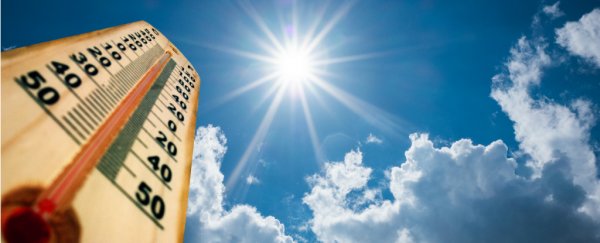It's hot. Too hot. And climate scientists agree that it's only going to get hotter. Yet despite the record-breaking heat wave impacting millions of Americans right now, barely anyone in the mainstream media is talking about the elephant in the room.
A new and distressing report from Media Matters reveals that most major broadcast TV networks are completely ignoring the link between unprecedented heat waves and climate change.
In the last week of June, the US was hit by a massive and powerful heat wave stretching right across the country. The dangerous temperatures are like nothing ever seen before, breaking 227 US records in the first week alone.
It would be nice to think that reporters would want to - no, have to - explain to the public why these dangerous and deadly temperatures are becoming more common and more intense. Media Matter's recent analysis puts that hopeful assumption to rest.
The report analyzed two weeks of TV segments on ABC, CBS and NBC. Out of all 127 segments featuring the US heat wave, only one bothered to mention climate change.
The thing is, no matter how many reporters fail to make this connection, climate scientists are positive that one exists. In fact, there is robust and overwhelming scientific evidence to suggest that human-caused climate change is impacting both the frequency and the intensity of heat waves.
"The overall trend over decades to more intense and more frequent heat waves is definitely a signal of global warming," UCLA climate scientist Daniel Swain told The New York Times about California's current heat wave.
Just this year, in an analysis published in Nature Climate Change, scientists concluded that by 2030, climate change, not natural variability, will be the primary cause of heat waves in both the western US and the Great Lakes region.
Watching the news, however, viewers would have no idea that these studies even existed.
Over a two-week period, from June 27 to July 10, ABC ran 32 segments on the heat wave. In the same period, NBC ran 59. None of these segments addressed how climate change can influence extreme temperatures.
In comparison, CBS managed to mention climate change in one of its segments on the heat wave, but even still, the 35 other segments on the network failed to do the same.
The limited and superficial coverage of basic climate science is abysmal, but it's also nothing new. TV networks have been under-covering climate change for years. A Media Matters study from last year found that over a two-week period during hurricane season, ABC and NBC failed to run even one segment on the link between climate change and hurricanes.
To be fair, there are some networks that are doing a better job. PBS News Hour, for example, ran two segments on the heat wave, with one of the segments explicitly discussing climate change.
"Global temperatures reached extreme highs this past week, something scientists have been warning of as part of the effects of climate change," the segment noted.
Still, 50 percent is not exactly a sweeping victory for climate coverage, and there's still plenty of room for improvement. Thankfully, the public, science advocates and science communicators are starting to fight back.
Local meteorologists, for instance, have been stepping up and using their platform to spread awareness about climate change and its influence on extreme temperatures and storms.
The pressure is also coming from the public, with scientists and science advocates calling out various networks for their substandard coverage of pressing environmental issues.
The problem is so extensive that even those outlets that are considered "liberal" have been accused of neglecting the topic. A recent Twitter thread by author and climate activist Dr Genevieve Guenther went viral after it called out NPR and a whole host of other news sources for under-reporting climate change.
"I happened to listen to @NPR for a few hours this morning, and I heard three stories that are very much connected to #climatechange without anyone on the radio mentioning climate change even once," Guenther wrote.
"It was surreal and disturbing."
1. I happened to listen to @NPR for a few hours this morning, and I heard three stories that are very much connected to #climatechange without anyone on the radio mentioning climate change even once.
— Dr. Genevieve Guenther (@DoctorVive) July 8, 2018
It was surreal and disturbing.
[thread]
The thread argues that because climate change is happening right now, in every part of the world, all journalists have a responsibility to address it, not just those with a science or environment beat.
10. We are undergoing climate change RIGHT NOW. It is global. Its signal is emerging in all sorts of events. It is part of the news ALL THE TIME.
— Dr. Genevieve Guenther (@DoctorVive) July 8, 2018
Yet we almost never hear about it, except in the "science section," or the "environment section," or the whatever niche section.
12. Media, you need to do better. Not just @NPR, but @MSNBC, @abcnews, @ABC, @CBSNews, @CNN, @NewsHour, all y'all. And @nytimes and @washingtonpost, your climate reporting is excellent, but you need to bring climate into your general coverage too.
— Dr. Genevieve Guenther (@DoctorVive) July 8, 2018
It's no secret that climate change can be a controversial and politically loaded subject, but journalism has a responsibility to tell the whole truth, no matter how inconvenient.
The new findings reveal just how extensive the media's climate silence has become.
The report has been published by Media Matters.
